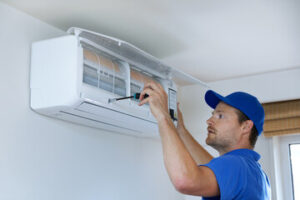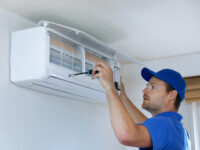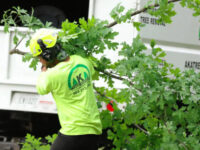Why AC Repair Is Necessary
While AC maintenance can keep your home comfortable, the parts of your system will eventually wear out. That’s why companies specializing in AC Repair offer services to clean and replace these worn-out components.
One of the most common problems is when a capacitor blows. This is an easy fix as the technician just has to cut power, disconnect, and replace it.
Many AC repair professionals recommend using a dehumidifier to manage excessive indoor humidity. Humidity makes the air feel thick and sticky and can make it hard to breathe, which can be uncomfortable. It can also cause mildew and other problems in the house, such as musty smells. Using a dehumidifier can help prevent these issues by removing excess moisture from the air, which in turn makes it feel colder.
A high level of humidity may not always indicate an air conditioner problem, however. In some cases, the humidity can be due to a weather-related issue, such as heavy rains or storms. In these cases, your AC system will not be able to cool down the house because it cannot extract the moisture from the air.
If the humidity is due to an indoor issue, it may be because of something as simple as a dirty air filter or clogged ductwork. Air filters can become clogged with dirt, dust, plant debris, and other contaminants, which can block the airflow and lead to a build-up of condensation in the ductwork. This can also cause your AC to blow out humid air, which is not what you want in a climate like Florida.
Other issues that can cause an AC to blow out humid air are a blocked drain line or frozen evaporator coils. When these issues are not addressed, they can result in a flooded AC unit that can cost you a fortune in repairs. Fortunately, these issues are easy to fix when caught early. Frozen evaporator coils can be thawed and cleaned quickly and easily, while a clogged condensate drain line will usually only require a new drain line.
Warm Air
The air that comes out of your vents should be cold, but if it’s warm instead, it could indicate the presence of an air conditioning problem. In most cases, a professional will be needed to fix the issue and get it running properly again.
One common AC repair involves a dirty filter that is restricting the flow of cool air. The filter should be replaced and, ideally, it should be done on a regular basis to keep your home feeling comfortable and healthy.
Another common issue is an overly full evaporator coil. If the coil is filled up with debris, it will restrict the flow of air, causing your system to work harder and become less efficient. This can also lead to the need for more frequent AC repairs.
It is also possible for the condenser unit to be blocked by outdoor elements, including dirt, leaves, and vegetation. If this happens, the unit will not be able to function. If you notice a blockage, it’s best to turn the system off and use a hose or blower to clean the coils.
Finally, it’s important to check that the return vents in your home are not blocked by furniture or other items. This can restrict the flow of air and cause your system to struggle to cool down your home.
Adding refrigerant is another common AC repair service that many technicians provide. This is usually a simple process, and your technician will first need to determine which type of refrigerant your system uses and how much pressure it should have. This will help them determine if there is a refrigerant leak that needs to be repaired, which will then allow them to refill the system and restore it to proper working condition.
Faulty Thermostat
The thermostat is a crucial part of the AC system that controls how your home is cooled. If it is faulty, then other parts of the air conditioner may also fail to operate properly. This can result in high electricity bills and poor cooling performance. In addition, a faulty thermostat can lead to inaccurate temperature calibrations by the AC system.
The most common thermostat problem is when it fails to communicate a change in settings with the rest of the system. This can be caused by a weak battery or other electrical problems. If the thermostat is still not responding, it may be time to replace its batteries.
Another common issue is when a thermostat is unable to read or maintain the temperature setting you have selected. This can be due to a variety of issues, including a worn out sensor that is no longer accurate or a malfunctioning circuit board.
Faulty sensors or a broken thermostat can cause the AC unit to overheat and create other problems, such as clogged condensate drain lines. A professional should always inspect and clean these lines to prevent leaks and reduce the risk of water damage in the home.
In some cases, a faulty thermostat can be repaired by shutting off power to the unit and manually testing each connection for proper operation. However, working around electrical components is dangerous and should be left to professionals who have the training and experience to safely perform these repairs. Additionally, any unauthorised repairs can invalidate the manufacturer’s warranty. Therefore, it is important to consult a certified AC repair technician for any issues with the thermostat. He or she can help you make the right decision about whether to repair or replace it.
Faulty Compressor
The compressor is one of the most expensive and important parts of your air conditioning system. It compresses refrigerant gas into high pressure allowing cool air to circulate throughout your home. A faulty compressor can affect your entire AC system by producing inconsistent cooling, resulting in hotter rooms and discomfort. The compressor is also the only moving part of your AC unit, meaning it’s more likely to wear out over time. Regular inspection and maintenance can help extend the life of your compressor.
Signs of a faulty compressor include rattling noises and leaking fluid from the condenser line. These sounds may signal that the compressor is experiencing mechanical problems such as failing bearings or loose components. You should always turn off your air conditioner if you hear any unusual sounds from the unit. This will allow you to save yourself from further damage and reduce the overall repair price for your air conditioning system.
Another sign of a faulty compressor is if your unit keeps short cycling. This happens when the compressor is overheating or drawing too much power. The circuit breaker will shut off the unit to protect it from a potential fire hazard, but you should call a professional as soon as possible to diagnose the problem and find a solution.
Faulty compressors can often be repaired, but it’s best to have a professional inspect the unit before making any repairs. Replacing an air compressor is a big job that requires the expertise of an HVAC technician. In most cases, it’s more cost-effective to replace the compressor with a new unit and recharge your AC with fresh refrigerant. A professional will also be able to check that the system is correctly charged and sealed properly to avoid further problems.
Faulty Blower Motor
When a faulty blower motor causes an AC unit to shut down, it may also cause other components in the system to stop working. A technician will begin by checking the fuses, relay, and resistors or control module to make sure they are functional. If they are, they will then turn their attention to the blower motor. First, they will remove the blower cover and let it cool down so that any metal parts inside will be safe to touch. Next, they will disassemble the fan and blower shaft and apply oil to the bearing or bushing to restore its smooth rotation.
If a blower motor is making unusual sounds, it could mean that there are problems in the fan assembly or in the blower itself. Rattling or screeching sounds suggest that a belt is worn out, while loud banging noises indicate that there are loose or broken parts somewhere. In some cases, these issues can be fixed by replacing a belt or lubricating the bearings.
Sometimes, an AC repair specialist will find that the problem with your blower motor is caused by something as simple as a blockage in the air ducts or by debris stuck in the fan blade. Other times, the problem may require a replacement motor or a more serious repair.
The best way to avoid a blower motor failure is with regular maintenance. This includes cleaning or replacing your air filter regularly and ensuring there are no obstructions in the air ducts. It is also important to keep your house well-insulated and closed so that the blower motor doesn’t need to work as hard to cool or heat your home.





